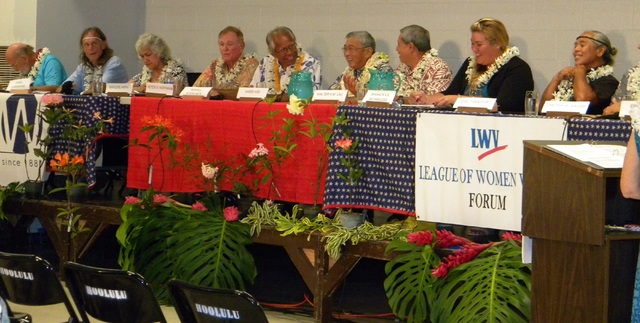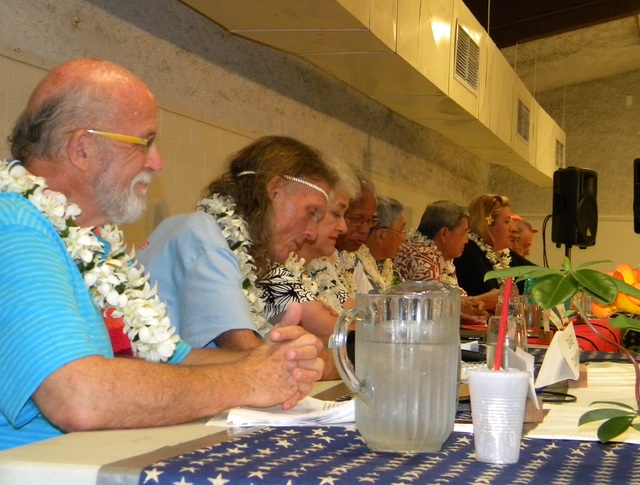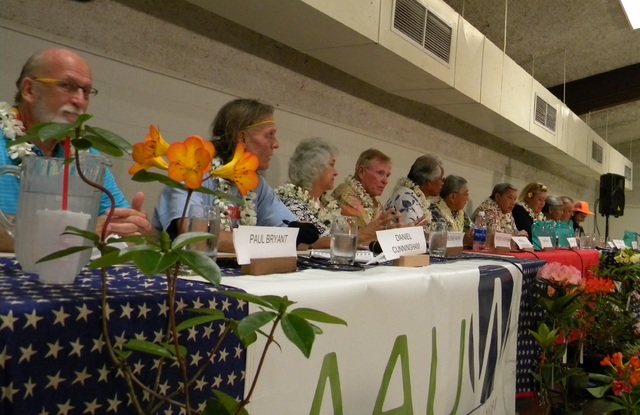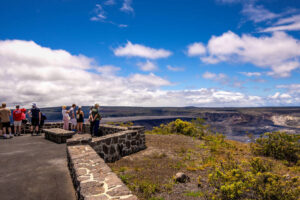New faces played off against old hands Wednesday evening during the final major mayoral forum before the Aug. 13 primary.
Top issues for most of the 11 candidates at the forum were poverty and homelessness, renewable energy, taxation, lagging infrastructure and trust, ethics and efficiency in government.
Several of the candidates took aim at the more experienced officials at the table, saying they haven’t done enough to solve problems facing Hawaii County.
“If they did the fantastic job they said they did, we wouldn’t be here with so many candidates,” noted Wendell Ka‘ehu‘ae‘a, a frequent candidate.
Ka‘ehu‘ae‘a, 73, of Hilo, a videographer and security guard, said the county needs an independent audit. He’d also like to review tax structure and beef up police emergency management and water safety.
“I’m the breath of fresh air,” he said, calling the more experienced officials “retreads.”
Gene Tamashiro, 59, of Hilo, a Hawaiian Kingdom activist, said kingdom laws must be taken into account in local government. He pushed for individual freedom and individual responsibility under law.
“I don’t have the managerial or administrative experience that some of our amazing candidates do,” Tamashiro said.
Paul Bryant, 71, of Papaaloa, a former journalist and operator of a fine arts gallery, lists a living wage, energy sufficiency and accountability of government employees as top concerns.
“Happy staffers translate into healthy sales,” Bryant said of raising the minimum wage to $15.
Daniel Cunningham, 64, of Hilo is a proponent of hemp as an alternative fuel. He said hemp can be used for energy and concrete.
“I am going to put everyone to work who wants a job and create a billion-dollar industry,” Cunningham said of hemp.
Marlene Hapai, 67, of Kurtistown, a science educator and former member of the University of Hawaii Board of Regents, lists health and safety as priorities. She’d rely on community development districts to steer solutions to local areas and partnerships with nonprofits and private businesses.
“Once we’re safe, it’s important to be sustainable,” Hapai said.
Pete Hoffmann, 75, of Waikoloa served eight years representing North Kohala on the County Council, including two years as chairman.
“If you’re satisfied with the same-old, same-old brand of politics we’ve had for the past two eight terms then I am not your man,” Hoffmann said.
He wants to create a county office of agriculture and pursue rural development grants to make the county not only self-sufficient, but as the breadbasket for the state.
“We don’t need to just create jobs; we need to create careers,” Hoffmann said.
Harry Kim, 76, of Hilo was the mayor for eight years after serving a decade before that as the voice of Hawaii County Civil Defense on the radio. He wants to restore trust in government.
“I don’t believe we need more rules and more policies,” Kim said. “We’re required by law to be transparent … and we should just follow it.”
Wally Lau 68, of Kailua-Kona most recently served as the county’s managing director, Mayor Billy Kenoi’s right-hand man. He wants to address homelessness and improve county permitting and licensing process, and stresses the need to balance the economy and environment.
He vowed his administration would be transparent, using technology to put documents on the county website.
“It is about communication,” Lau said. “It is about being open and honest with each other.”
Shannon McCandless, 31, of Waimea said she’s the candidate with a “vested interest” in the future.
“We need a leader who’s not just preparing for now,” McCandless said, adding she has “vision, long-term fortitude and the ability to plan long after the current.”
McCandless, a supervising driver license examiner, said she’s handled a $1.4 million budget at her county job and she thinks she can use that experience to improve government efficiency. She said nonprofits need funding to tackle social ills.
Timothy Waugh, 50, of Hilo, a pastor, would streamline building permits and push for open bids for public projects.
“We have county inspectors that believe in their heart they can override everyone who approved your plan,” Waugh said.
He also wants a countywide public water system to start eliminating water catchment systems.
Eric Drake Weinert Jr., 31, of Papaikou, a natural farming educator, is an environmentalist pushing for more local agriculture.
“A healthy ecology translates into a healthy economy,” Weinert said. “Every one of us has to eat.”
Asked about the Thirty Meter Telescope, all but three of the candidates favored it. But many said the state dropped the ball in the permitting process, and needs to work harder at community buy-in.
“Retain this clean, productive industry,” Hapai said. “Astronomy is a clean industry and every telescope brings in 80 high-income jobs.”
Cunningham said the TMT doesn’t need to be on Mauna Kea because it could be put far offshore instead. Tamashiro said he’d been arrested because of his opposition to the telescope. Weinert said there’s no need to rush into the project, so there’s plenty of time to work with the opponents in the community.
Candidates pushed for reuse of garbage rather than creating a new landfill to handle waste from the Hilo landfill, which has about four years of capacity left. Trucking of garbage may have to increase to the Puuanahulu landfill, however, most candidates said.
Weinert pushed for less packaging and fewer plastic containers being brought to the island.
The forum, at Aunty Sally Kaleohano’s Luau Hale, sponsored by the League of Women Voters and American Association of University Women Hilo, drew more than 100 people.
If no candidate gets more than 50 percent of the vote, the top two contenders will face off in a runoff in the Nov. 8 general election. Walk-in voting starts Monday.
Alvin Akina, 72, a hotel industry retiree and Kailua Village Design commissioner, and Helen Olena Luta, of Kealakekua, are also on the ballot but did not attend the forum.
Email Nancy Cook Lauer at ncook-lauer@westhawaiitoday.com.











